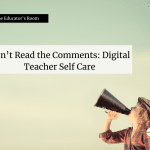Have you signed up for The Educator’s Room Daily Newsletter? Click here and support independent journalism!
Every profession has its detractors. Society can find fault with just about anyone doing their job, except maybe a baker. Never heard a bad thing about a baker.
When it comes to teaching, George Bernard Shaw once famously said that “those that don’t know, teach.” You’ve heard the quote, of course. But did you know it came from a long-dead playwright who advocated for eugenics and against vaccinations?
Teachers Deserve Praise
In recent years, teachers have had a lot worse hurled at us. You’ve heard it. You’ve seen it. And teachers giving up the job they love describe its effects again and again.
But friends, teachers, speech-language pathologists, lend me your ears: You could not have made it through this last year unless you did know, and it’s time for us to revisit Mr. Shaw’s infamous quip.
In fact, I believe it’s time for us to turn it on its head. It’s time for teachers to stop modestly criticizing ourselves for doing only a decent job and start celebrating ourselves for doing a job that few others can or will.
And it’s crucial for educators right now to take stock, if few others will, because an efficacious teacher does a far better job than one who isn’t so. Our students need us to know in our bones that we are spectacular.
Your students need you to know as well.
And since we have our summer off (without being paid, Mr. Shaw), here are three things to ponder before you slip down the rabbit hole into self-criticism. I assure you that even if you think you were terrible this year, these three reasons — despite what anyone else thinks, what you taught, what you may have thought yourself, and what idiots say on television — define you as a teacher worthy of praise. That means self-praise too.
Reason #1 You taught during a singularly unique crisis, with virtually (pun intended) no help.
Anyone teaching virtually during this time knows what attendance looked like. And anyone teaching knows what the actual participation rate was. In my classroom, COVID-19 sent half of my class home. Twice. When students came back at all kinds of levels, I was teaching a classroom with what felt like 29 individualized education programs. Meanwhile, so many routines and structures became “optional.” These changes were well-intended with equity in mind. Still, I have to ask: Did the changes make the job of keeping students working and learning easier or harder?
You did it anyway, like a captain directing wounded soldiers into battle with poor equipment and faulty orders.
And that makes you a freaking hero in any playwright’s book worth a damn.
Reason #2 You held the line and took the brunt, regardless of reinforcement.
The news is filled with stories of parents storming school boards and school offices. But you and I both know who has taken the brunt of parental rage in recent years. In the last year alone, I’ve been asked to teach the “alternative version” of a spherical Earth, threatened with lawsuits, bodily harm, and unkind messages over grades, and screamed at by an angry parent. I understood some of that as the strain parents were under, but it didn’t make any of it easier.
You probably endured similar attacks or worse, but you survived. When a counselor was unavailable, you counseled the child that was at their rock bottom. When resources were not available to redirect a child’s behavior, facilitate social justice, or counsel a child in need, it became your issue. When curriculum guides didn’t match the needs or interests of your students, you adapted them and in some cases, created entirely new curriculum. You held the line. We both know it, and it’s time you heard someone else say it. This should be a badge of pride!
Reason #3 Your students learned, and they appreciated your efforts and hard work.
As COVID-19 restrictions loosened, many students who I knew only virtually came to see me in person. I had never seen one young man in person, even though I had taught him for an entire year virtually. When he saw me, he burst into tears, hugging me like a long-lost relative!
Has something like this happened to you? If so, why? Because these kids watched us give our all on Zoom in the upstairs playroom while our children tore up our home in the living room. And they know something that detractors don’t. Teaching a classroom of children online was one of the hardest things we could ask a person to do during the hardest time a child could have been asked to learn. Asking teachers to come back, prepare kids for state-mandated testing, and pretend as though all children had been productive online? Insane. You fought technology issues, attitudes and personalities, behavior, economics, social and emotional crises, and parental fatigue. Then, you fought a gap in reading and math levels, chronic absenteeism, and other obstacles. If you are an educator of color you did this while navigating racism on top of it all. In other cases, you dealt with ignorance and idiocy around everything from those against historical truth to those who would ask teachers to arm themselves. Your kids know the work you put in to get them back on track. Don’t we know it too?
Teachers, librarians, paraeducators: What you did this year was nothing short of incredible. I am certain that in addition to these three reasons above, you could add quite a few more reasons yourself. And you know what? You should do that.
We all should. Because long-dead Irish playwrights, ignorant politicians, and TV pundits are all entitled to their opinions. And so are you!
A Better Perspective on Teachers
Maybe if the present times are not kind to teachers, we should look to a time when the opinions towards teachers were a tad more favorable. One of my favorite opinions about teachers comes from Aristotle, writing to his student, Alexander the Great: “Those that know do, those that understand, teach.”
Unlike the playwright Mr. Shaw, Aristotle, the teacher, was right. We teach because we understand how, what, and why we teach. It is our calling. It is our profession. So when you are at your lowest, or think anyone else could have done it better this year, reflect on one last thing: Aristotle was the student of Plato, and Plato was the student of Socrates. Socrates was sentenced to death for corrupting his students, despite no evidence of actually doing anything of the sort. Why?
Because those who don’t know accuse or discredit teachers instead of lifting them up or acknowledging the incredible work teachers do. We do the work that no one else can or is willing to do. And those that do know this about our profession support us.
And those that understand that, who feel it in their bones, teach on.
Editor’s Note: If you enjoyed this article, please become a Patreon supporter by clicking here.






